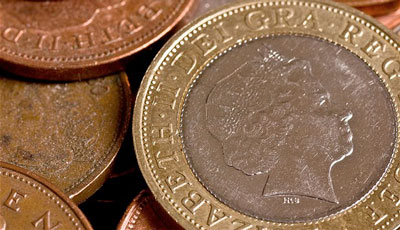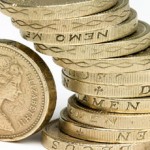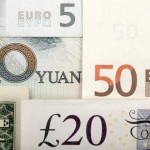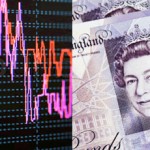Pound is bullish as Shine Comes Off

The shine is starting to come off the U.K. pound, which has given up its reign as the most popular bullish bet for 2014 among the Group of 10 currencies.
Hedge funds and other large speculators cut their net wagers on a sterling advance by 28,915 contracts in the three weeks ending July 25, the biggest reduction in a year, data from the Commodity Futures Trading Commission in Washington show. The currency slipped to $1.6944 yesterday in New York from an almost six-year high of $1.7192 July 15 amid speculation much of the good news on Britain’s economy is reflected in the exchange rate.
“There have been pullbacks in the past, but this time it may be different,” John Hardy, the head of foreign-exchange strategy at Saxo Bank A/S in Hellerup, Denmark, said yesterday by phone. “At this level, sterling will need constant new inputs to justify its price. We may have seen the top in the pound-dollar exchange rate.”
While the U.K. has recovered the output lost during the financial crisis and is on track to be this year’s best-performing Group of Seven economy, investors say sterling will start to face headwinds. The U.S. Federal Reserve is on course to end its dollar-depressing bond purchases this year and, in London, Bank of England Governor Mark Carney has sought to temper bets on higher interest rates, which would make the pound more profitable for investors to hold.
Too Strong
Sterling has appreciated 10.5 percent against the dollar in the past year, the most among 31 major currencies tracked by Bloomberg. Against a basket of nine other developed-market peers, it has gained 11.4 percent, Bloomberg Correlation-Weighted Indexes show.
The International Monetary Fund said yesterday in its External Stability Report that the pound is overvalued by 10 percent to 15 percent. Saxo Bank sees it falling about 4 percent to $1.62 by year-end. After raising their forecasts to as high as $1.70, the median estimate of more than 60 strategists in a Bloomberg survey is for it to stay little changed at $1.69.
Britain’s currency has been driven higher by the nation’s recovery, with growth domestic product seen expanding this year by 3 percent in survey of more than 50 economists by Bloomberg.
Rate Outlook
Speculation has risen that Carney, who took the helm at the BOE just over a year ago, will raise the bank’s 0.5 percent main interest rate in 2015. Higher rates tend to attract international investment. The 49-year-old tempered those expectations in a July 23 speech in Glasgow, Scotland, saying increases will, once they start, be “gradual and limited.” He said “extraordinary forces” still confront the U.K. economy.
Before the speech, bullish wagers on the pound versus the greenback reached an almost seven-year high.
Speculators’ bets on an advance exceeded those on a decline by 56,412 contracts in the week ended July 4, the most since December 2007, CFTC data show. The pound had the most so-called net longs of any G-10 currency from April until July 15, when the Australian dollar took over.
As recently as November, speculators were betting on a drop in Britain’s currency. The slide in bullish sentiment this month is the biggest since the four-week period ended July 26, 2013, when investors cut their positions by a net 30,224 contracts.
‘Topping Out’
“The pound has come a long way and it appears to be topping out,” Bill O’Neill, the London-based U.K. chief investment officer at UBS AG’s wealth-management unit, said in a July 24 interview. “Long pound-dollar positions have gone from being a contrarian view in the summer of last year to being pretty much a consensus. A lot of good news about the U.K. is already in the price.”
O’Neill’s firm oversees $2 trillion. Its parent, Switzerland’s biggest bank, predicts the pound will climb an additional 3 percent this year to $1.75.
While gross domestic product expanded 3.1 percent in the second quarter, some sectors are struggling. Industrial production and manufacturing have remained sluggish and real wages are falling.
One industry doing better than most is real estate. Neil Jones, an analyst at Mizuho Bank Ltd., cited yesterday’s better-than-forecast mortgage-approvals (UKMSVTVX) data as evidence for his view that the pound selloff is temporary. Approvals rose to a four-month high in June, the first increase since January.
Strength ‘Intact’
While the market is in “long-pound reduction mode, we personally sense the longer-term uptrend holds intact,” the London-based Jones said yesterday by e-mail. “The U.K. economy will power on, and so too will the pound.”
The prospect of an increase in U.S. interest rates will do more to cap the pound’s gains than BOE policy, said Stephen Jen, managing partner at SLJ Macro Partners LLP in London.
While Fed Chair Janet Yellen told lawmakers this month that the U.S. still needs an accommodative monetary policy, she also said borrowing costs may rise sooner than investors expect.
Jen and O’Neill at UBS both see the pound stalling against the dollar as a result, though they expect further gains versus the euro on bets the European Central Bank will ease further. Sterling has surged 9.3 percent versus the euro in the past year, the most since the shared currency’s 1999 debut.
“The pound-dollar exchange rate may encounter some headwinds in the period ahead, and it will be about the recovery in the U.S. more than the U.K. story,” Jen said in a July 24 interview. “A lot of good news has been in the price.”
Source: Bloomberg



























